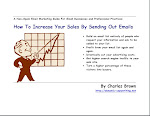As I mentioned recently in an article called How to Use Case Studies to Promote Your Business, case studies can be one of the most effective methods of promoting your business.
A good case study is the story of how your firm solved a serious problem for one of your customers or clients. The customer, of course is the star, but you or your firm is the agent of change that turned the situation around.
In a real way, a case study is better than a referral because it is a compelling story. When other business people read how you solved someone else's problem, they will likely realize that you are the best person or business to solve their problem as well.
How can you market your business with case studies?
- Include it in a press release. The media is always looking for new stories that contain a practical problem solving element to them. Your press release may be no more than an abridged version of the case study with a mention that the full version is available upon request.
- Send it to prospects or existing customers. Sending out case studies is a great way to keep in touch and to let people know what you do. The story "feel" of a case study makes it seem much less like a marketing piece, and therefore softens the sales message while at the same time making it more effective.
- Give it to your sales people. Sales people love case studies because they are "proof" of your effectiveness in solving problems. They can use them in their presentations to demonstrate key points andas testimonials. They also make convincing sales brochures.
- Post it on your website. Providing quality, useful content on your site is a powerful way to increase traffic.
- Use case studies as articles in your newsletter. These success stories show real world examples of how you solve problems in your market place. Even if your newsletter is an internal piece for employees, it still helps to educate your own people.
- Use case studies as a speaking topic. If your executives occasionally give speaches or talks, a case study makes an excellent presentation. It can be adapted as a powerpoint or a handout.
- Include case studies in proposals for new business. When you are competing for new business, a proposal that contains one or more case studies demonstrates very effectively your firm's competancies.
- Adapt case studies as lead generation materials. Not only is it a great free giveaway, it can also be a tremendous enticement for prospects to request the full version if your piece only gives them the first part of the case study. Think of it as a cliff hanger that they must request the rest of the story to find out how a problem was resolved.
- Use as testimonials. As a general rule, client testimonials are nice to have but lack the power of a story. By asking clients who send in positive feedback to be interviewed for a case study, you convert their comments into a compelling success story.
- Use as a trade show handout. Case studies are much better than free golf balls as a way to interest prospects and turn them into clients. You might even enlarge the case study to print on your exhibit wall for all passersby to see.
COPYRIGHT © 2008, Charles Brown

Labels: case studies, lead generation, press releases, proposals, storytelling
Subscribe to:
Post Comments (Atom)



Hi Charles,
Posting a case study to a display at a trade show is a terrific tip.
Here's another marketing tip using case studies: Use them for advertorial content in trade magazines.
All best,
Sonya Carmichael Jones
http://www.marketingbuddha.com
Anonymous said...
4:49 PM
Sonya,
That's an excellent idea. Trade magazines are always looking for good content and a case study certainly fits the bill.
The point is case studies really fill a need in the market place. They give potential clients a way to understand what a company can do, and they give a company a better way to show off what they can do for such a client.
So the question is, why aren't case studies used more often?
Charles Brown
Charles Brown said...
1:59 PM